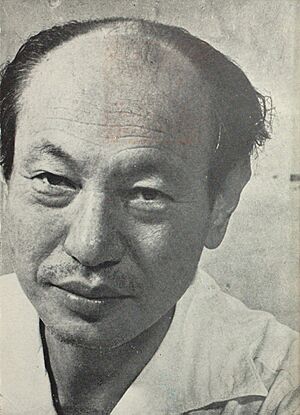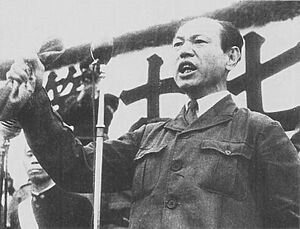Kyuichi Tokuda facts for kids
Quick facts for kids
Kyuichi Tokuda
|
|
|---|---|

Tokuda c. 1952
|
|
| General Secretary of the Japanese Communist Party | |
| In office 3 December 1945 – 14 October 1953 |
|
| Preceded by | Toshihiko Sakai |
| Succeeded by | Sanzo Nosaka |
| Member of the House of Representatives for Tokyo 3rd district |
|
| In office 4 April 1946 – 6 June 1950 |
|
| Personal details | |
| Born | 12 September 1894 Nago, Okinawa Prefecture, Empire of Japan |
| Died | 14 October 1953 (aged 59) Beijing, China |
| Political party | Japanese Communist Party |
| Alma mater | Nihon University |
| Occupation | Lawyer |
Kyuichi Tokuda (徳田 球一, Tokuda Kyūichi, September 12, 1894 – October 14, 1953) was an important Japanese politician. He was the first leader of the Japanese Communist Party from 1945 until he passed away in 1953. He played a big role in Japan's history after World War II.
Contents
Early Life and Political Beginnings
Kyuichi Tokuda was born in 1894 in Okinawa, a southern part of Japan. After studying at Nihon University, he became a lawyer in 1920. In 1922, he joined the Japanese Communist Party and became a key member of its main committee.
Joining the Japanese Communist Party
In 1922, Tokuda helped create the Japanese Communist Party. At that time, the party was not allowed by the government. He visited the Soviet Union in 1925 and again in 1927. In 1928, he tried to become a member of parliament but was not successful.
Time in Prison
In March 1928, Tokuda was arrested. He was accused of breaking laws that aimed to control political groups. He spent 18 years in prison. From 1934 to 1940, he was held at Abashiri Prison.
On October 10, 1945, a French journalist named Robert Guillain found Tokuda and helped him get released from Fuchu Prison. Another Communist leader, Yoshio Shiga, was in the cell next to him. When Tokuda was freed, people cheered and celebrated his release.

Post-War Activities and Leadership
After World War II ended, Tokuda was elected to the House of Representatives in 1946. This is like being a member of parliament. His cousin, Senzo Nosaka, who had returned from China, was also elected. In the same year, Tokuda married his cousin Kosaku's widow, Tatsu Tokuda.
Challenges and Exile
Tokuda was involved in a big workers' strike in 1947. In 1948, someone tried to hurt him by throwing a bomb-like object at him while he was giving a speech, but he survived. By 1950, he was a very important leader in the Japanese Communist Party.
Around this time, his party faced some internal disagreements. He was also removed from public office and politics by the Allied forces who were occupying Japan after the war. In October 1950, he secretly left Japan and went to China.
Leadership from Exile
From China, Tokuda continued to guide the Japanese Communist Party. He led a group within the party and organized some secret activities in Japan. He passed away in Beijing, China, in 1953. His death was kept a secret until 1955. A memorial service was held for him in Beijing, with many people attending.
A Nod from Khrushchev
In 1956, at a big meeting of the Communist Party of the Soviet Union, the leader Nikita Khrushchev asked everyone to stand to honor important Communist leaders who had died. He mentioned Kyuichi Tokuda, even though Tokuda was not well-known in the Soviet Union. This was seen as a way for Khrushchev to subtly criticize Joseph Stalin, who had recently died.
Writings and Publications
- Eighteen Years in Prison (Gokuchu juhachi-nen) by Kyuichi Tokuda and Yoshio Shiga. This book was published by the Japanese Communist Party in 1948.
- Appeal to the People
See also
- Japanese dissidence during the Shōwa period
- Mountain Village Operation Unit
 | William Lucy |
 | Charles Hayes |
 | Cleveland Robinson |

